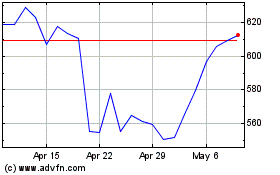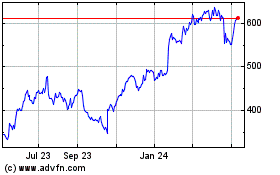Discovery Profit Rises, but Content Costs Weigh on Europe--Update
February 14 2017 - 2:54PM
Dow Jones News
By Keach Hagey and Austen Hufford
Discovery Communications Inc. posted profit growth in the
December quarter, thanks in part to one-time items, but its
operating results were nearly flat owing to higher sports and other
content costs in Europe.
Known for inexpensive nonfiction content on such channels as
Discovery, Animal Planet and TLC in the U.S., Discovery has pursued
a different strategy in Europe. It bought the pan-European sports
channel Eurosport and went after the European rights to the
Olympics beginning in 2018 and, on rare occasions, expensive soccer
rights like the Bundesliga in Germany.
The latest results showed some of the potential risks of this
strategy, as adjusted operating income at Discovery's international
networks dropped 12% owing to the increased cost of sports rights
for Eurosport and a more than $20 million write-down at Discovery's
Nordics business. That write-down was caused by a pivot from more
expensive Hollywood content toward more local fare after
competition from services like Netflix Inc. and HBO caused
viewership to decline about 20% over the last 2 1/2 years,
Discovery Chief Executive David Zaslav said in a call with
analysts.
The latest results showed some of the potential risks of this
strategy, as adjusted operating income at Discovery's international
networks dropped 12% due, among other things, to the impact of
currency swings and the increased cost of sports rights for
Eurosport. The company also took a more than $20 million write-down
at Discovery's Nordics business as it pivoted from more expensive
Hollywood content toward more local fare after competition from
services like Netflix and HBO caused viewership to decline about
20% over the last 2 1/2 years, Mr. Zaslav said.
However, Mr. Zaslav fiercely defended the broader Eurosport
strategy, saying that in general the channel has steered clear of
snapping up expensive soccer rights in Europe. He also said that
having sports is helping Discovery sell its roughly 10-channel
bundle across the continent and fetching higher ratings.
"Eurosport helped us grow international affiliate revenues in
2016 by 10%," he said on the call. "Our local premium and exclusive
sports rights drove Eurosport viewership up 23% in the fourth
quarter."
During the quarter ended in December, international networks'
revenue grew 0.4%, with currency fluctuations reducing growth by
5%. International distribution revenue was up 3%, or 10% excluding
currency impacts. International advertising declined 2% or,
excluding currency effects, increased 3%.
In the U.S., revenue grew 3% to $812 million, owing to a 6%
increase in distribution revenue and a 1% increase in advertising
revenue. Distribution revenue was driven by higher rates, partially
offset by a decline in subscribers, while advertising was driven by
higher prices, offset by lower ratings.
On the call, Discovery's departing Chief Financial Officer Andy
Warren said that there had been an acceleration of the subscriber
declines at the networks that aren't fully distributed, but that
the company's "economics aren't embedded in those networks."
"We got out in front of this idea of focusing our channels," Mr.
Zaslav said, in a reference to the news last week that Viacom Inc.
was shifting its strategic focus to six core networks out of a
portfolio of roughly two dozen. "Our deals [with distributors]
provide about 85% of the economics against five of our
channels."
Those channels are Discovery, Animal Planet, TLC, Science and
ID.
Mr. Zaslav said Discovery is also focusing on "niche categories"
where it has "dominant consumer and brand advantage," such as ID
and Velocity.
"We see huge potential to expand these genres on and off the
traditional TV screen such as through dedicated digital-only
content verticals, [subscription online video on demand] channels
and through partnerships such as our recent agreement with Amazon,"
where the companies launched True Crime Files last November and
already have 10,000 subscribers paying $4 a month, Mr. Zaslav
said.
"This is just the first of several niche verticals we plan to
introduce as we continue to monetize our library content on a
direct-to-consumer basis," Mr. Zaslav said.
In all, Discovery reported a profit of $304 million, or 52 cents
a share, up from $219 million, or 34 cents, a year earlier. On an
adjusted basis, earnings per share were 56 cents.
Total revenue rose 1.6% to $1.67 billion.
Analysts polled by Thomson Reuters had expected revenue of $1.69
billion and adjusted earnings per share of 47 cents.
Discovery shares were down 1.4% in early afternoon trading.
Write to Keach Hagey at keach.hagey@wsj.com and Austen Hufford
at austen.hufford@wsj.com
(END) Dow Jones Newswires
February 14, 2017 14:39 ET (19:39 GMT)
Copyright (c) 2017 Dow Jones & Company, Inc.
Netflix (NASDAQ:NFLX)
Historical Stock Chart
From Mar 2024 to Apr 2024

Netflix (NASDAQ:NFLX)
Historical Stock Chart
From Apr 2023 to Apr 2024
